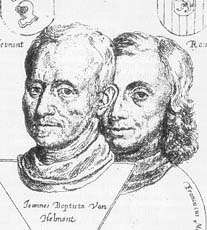Johann Baptista von Helmont
| Jan Baptist van Helmont | |
|---|---|

Jan Baptist van Helmont (left) and his son Franciscus-Mercurius from the Ortus medicinae (1648)
|
|
| Born |
12 January 1580 Brussels, Southern Netherlands |
| Died | 30 December 1644 (aged 64) Vilvoorde (in present-day Flemish Brabant), Southern Netherlands |
| Nationality | Flemish |
| Known for | pneumatic chemistry |
| Scientific career | |
| Fields | Chemistry, physiology, medicine |
| Doctoral advisor |
Martinus Antonius del Rio Adam Haslmayr |
| Influenced | Franciscus Sylvius |
Jan Baptist van Helmont (/ˈhɛlmɒnt/;Dutch: [ˈɦɛlmɔnt]; 12 January 1580 – 30 December 1644) was a Flemish chemist, physiologist, and physician. He worked during the years just after Paracelsus and the rise of iatrochemistry, and is sometimes considered to be "the founder of pneumatic chemistry". Van Helmont is remembered today largely for his ideas on spontaneous generation, his 5-year tree experiment, and his introduction of the word "gas" (from the Greek word chaos) into the vocabulary of scientists.
Van Helmont was the youngest of five children of Maria (van) Stassaert and Christiaen van Helmont, a public prosecutor and Brussels council member, who had married in the Sint-Goedele church in 1567. He was educated at Leuven, and after ranging restlessly from one science to another and finding satisfaction in none, turned to medicine. He interrupted his studies, and for a few years he traveled through Switzerland, Italy, France, Germany, and England.
Returning to his own country, van Helmont obtained a medical degree in 1599. He practiced at Antwerp at the time of the great plague in 1605. In 1609 he finally obtained his doctoral degree in medicine. The same year he married Margaret van Ranst, who was of a wealthy noble family. Van Helmont and Margaret lived in Vilvoorde, near Brussels, and had six or seven children. The inheritance of his wife enabled him to retire early from his medical practice and occupy himself with chemical experiments until his death on 30 December 1644.
...
Wikipedia
